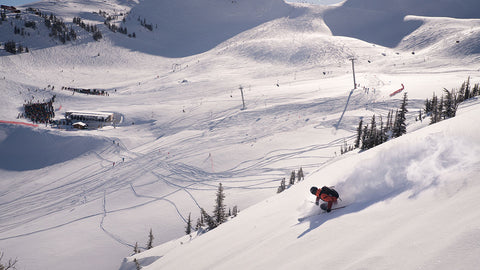
How Ski Fit Are You?
How Ski Fit Are You? This question depends on your goals. If you're just wanting to cruise the blue runs and hit après before lunch, maybe you're already there. If you want to drop 40 foot cliffs or send XL booters with confidence, your ski fitness is probably a big focus as you get ready for winter.
Well whether you're worried about how you feel after a day boosting it through the park or finding your quads are giving up after just half a day of tits-deep-pow; you're going to need to take note of a couple things:
- Pro Skiers' are spending more time dry-land training using off mountain training gear like the Tramp Skis and Jib Bar. Ski training equipment allows Pros to develop new skills and keep their ski muscles firing all year round. Other great dry-land training is resistance training and cardiovascular training; giving the pro's the extra edge to push their skiing further.
- Stretching, yoga, and proper nutrition are the answer.
- Maintaining your fitness reduces injuries, which ultimately leads to more days skiing!
Now is the time that YOU get ski fit too!
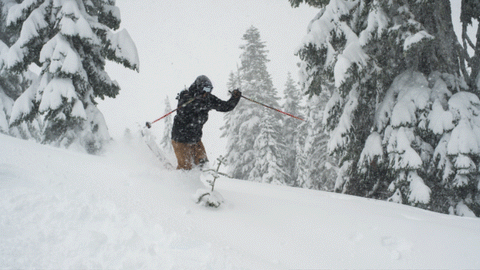
Ski Injuries & Why We Train
Skiing and injuries go hand in hand. If you've been skiing for years, then the chances are that you've pulled, torn, broken and/or had surgeries on various body parts (Why do we do this to ourselves?). In many ski towns, this is often a pre- requisite of being a local. However, rather than looking at these injuries as an inevitability, see them as learning opportunities to become a more well-rounded and injury resistant skier!
A proper training program, both on and off the snow brings improved strength, balance, flexibility and stamina. These are all necessary qualities to keep you progressing and killing it on the hill. As others are starting to fade and wash out, you'll be able to continue to shred all day with ease.
Ski Specific Training
The best and by far the funnest place to start your ski training is with ski specific training gear. This means pulling out your Tramp Skis and Jib Bar to replicate the feel of skiing (but in the comfort of your living room).
We have pro skiers like Dean Bercovitch, Magnus Granér, Henrich Harlaut, Thibault Magnin and Kai Jones who all use our gear for rehab, injury prevention and for muscle memory. Need more convincing? We ALSO have Olympic teams like the USA, Great Britain, Canada, China and Germany using our gear in physio and rehab programs. The reason being; with our gear, you can train safer, while also improving your muscle memory and your coordination and balance.
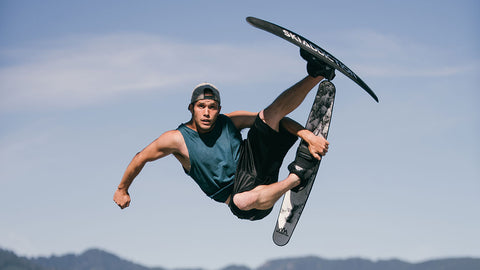
Dean Bercovitch getting in some off-season training
Resistance Training
The foundation that'll get you pushing harder on the hill will be your resistance training or weight lifting. This is vital for so many reasons beyond just having bigger biceps or a shredded six pack. Your muscles are what support and move your body and therefore putting in these gym hours will be sure to help you jump higher, balance better and absorb more effortlessly.
Add to this the fact that Muscles act as the shock absorbers for your skeleton and connective tissue. When they aren't strong enough to absorb a wicked knuckle slam; bones break, joints dislocate and muscles, tendons and ligaments can get strained, sprained or worse yet, torn!
Stretching
The next component of your off-snow training that you should be getting done daily is some good ol' stretching. As you know, your muscles control your body and tendons connect these to your skeleton. When your muscles start to tighten up from too much use, they pull your skeleton out of its proper alignment. This can lead to achy knees, stiff back, sore shoulders and a body that feels 20 years older than it should. The good news is that with proper stretching and foam rolling, most chronic aches and pains can be greatly decreased or totally eliminated.
Stretching will make it easier to tweak out your tricks and execute grabs you've never been able to do before! Start small by doing 5-30 minutes of concentrated stretching once or twice a day, that will be more than enough. Yoga is another fantastic way of stretching and relieving stress, with many pro skiers now including it in their training programs.
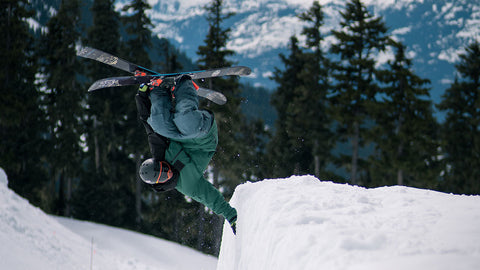
Flexibility is the key!
Cardiovascular Endurance
Cardio training doesn't have to be as repetitive as sweating it out on a treadmill. Cardio can be anything that will get your heart rate elevated for an extended period of time. When we take a lap through the park, we are using a ton of muscles and therefore putting high oxygen demands on our body. This, in turn, gets our heart beating much faster - approximately 140-180 beats per minute!
The goal of cardio training is to increase our cardiovascular fitness and endurance to a level where you can comfortably get through an average day of skiing and ultimately be able to ski harder for longer. Finding a cardio workout that you enjoy when the mountain closes or once the snow has disappeared is the key to maintaining your fitness. 5-30 minutes of training with ski specific tools like the Jib Bar and Tramp Ski is a killer workout. We honestly bet you can't go more than 5 minutes of using our gear without needing a rest. If you can, let us know as we can make the challenges harder for you! Activities that get your heart rate up fast is awesome for busy people, as it will not only save you time and challenge your fitness levels but also directly improve your skiing too!
Nutrition
What you put into your body is the fuel for before, during, and after your day skiing. Eating the proper foods at the right time will not only help you recover from your workouts and build some muscle along the way, but will also maximize your energy levels while you're riding.
Actual Skiing (Yew!)
Ok, so there is one activity that hasn't been mentioned and it's kind of an important one... Actual skiing! During the winter this can definitely be your cardio workouts on the days you make it to the hill. On the days you can't get a shred in, just try to get in some of the other activities listed above.
One way to maximize your fitness and skill levels is by choosing one feature to focus on and only hitting that for 30-45 minutes. Yes, this means you'll either be hiking rails/ jumps after every hit or doing repetitive laps through the park. Repetition, as you already know, builds the muscle memory which in turn helps to refine the skill that you're training.
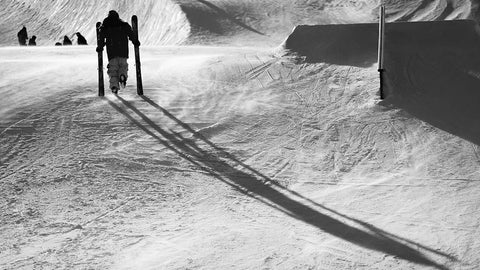
So There You Have it!
These are just a few of the reasons why you should give these recommendations more than just a passing glance. The results that come from putting in the time off the mountain will be worth it as soon as you step in on the mountain. After all, the challenges that takes hard work to achieve will be the ones that you get the greatest satisfaction and feeling of accomplishment from!
Want to train with the gear Pro's use?
Ollie Barbour
Ski Addiction
Helping You Ski Better



